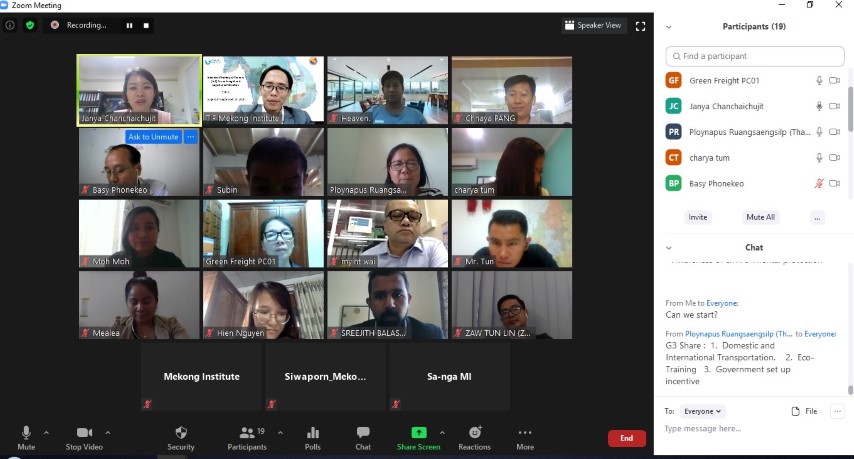Mekong Institute (MI) rolled out the “Advanced Training of Trainers on Green Freight and Logistics Certification” from August 24 to September 11, 2020 as part of its efforts to promote efficient and environment-friendly freight and logistics practices in the Mekong region.
“Logistics are at the heart of modern transport systems. As such, this training highlights supply chain management practices and strategies that will reduce environment and energy footprints for the region’s sustainable development,” Mr. Madhurjya Kumar Dutta, MI’s Director for Trade and Investment Facilitation, said at the opening session of the two-week digital training course. He added that the training presents measures in strengthening supply chain networks to mitigate the impacts of the COVID-19 pandemic.
Designed as a blend of online and off-line activities, the objectives of the training are to advance knowledge on global freight and logistics, widen information access to green freight technologies and certification standards, and more importantly, spur collective action among Mekong country representatives to roll out practices for the reduction of logistics and transport costs for the overall economic improvement of the economics of Cambodia, Lao PDR, Myanmar, Vietnam, and Thailand.
“MI’s training helped open a sustainable route in Lao PDR’s green transport development,” said Mr. Basy Phonekeo, one of the 19 participants who completed the training. As the Deputy of the Head of Road and Bridge Sector of Lao PDR’s Department of Public Works and Transport, Mr. Phonekeo shared that MI’s activities fostered knowledge sharing of best practices and propelled commitment among training participants—who represent the government and private sectors from Mekong countries—to synergize logistics and transport plans.
In addition to knowledge building on technical areas in global freight and logistics, smart logistics business analytics, green freight labelling, certification, and green technologies, the training also introduced modern concepts in logistics business analytics to underscore the value of synthesized data for more efficient and user-driven business operations.
“Through all the sessions, MI underscored the value of collectively strengthening our logistics supply chain, while protecting the environment,” said Mr. Subin Pongpanmeesuk, Marketing and Sales Manager of BP Supakij.
Supported by the Mekong-Republic of Korea Cooperation Fund (MKCF), the training was completed under the three-year project on “Green Freight and Logistics Development in the Mekong Countries.” The project is in line with the MKCF Action Plan, which promotes development cooperation between Mekong and the Republic of Korea in the preservation of the ecosystem, promotion of green growth, and the further strengthening of capacities of representatives from Mekong countries.








